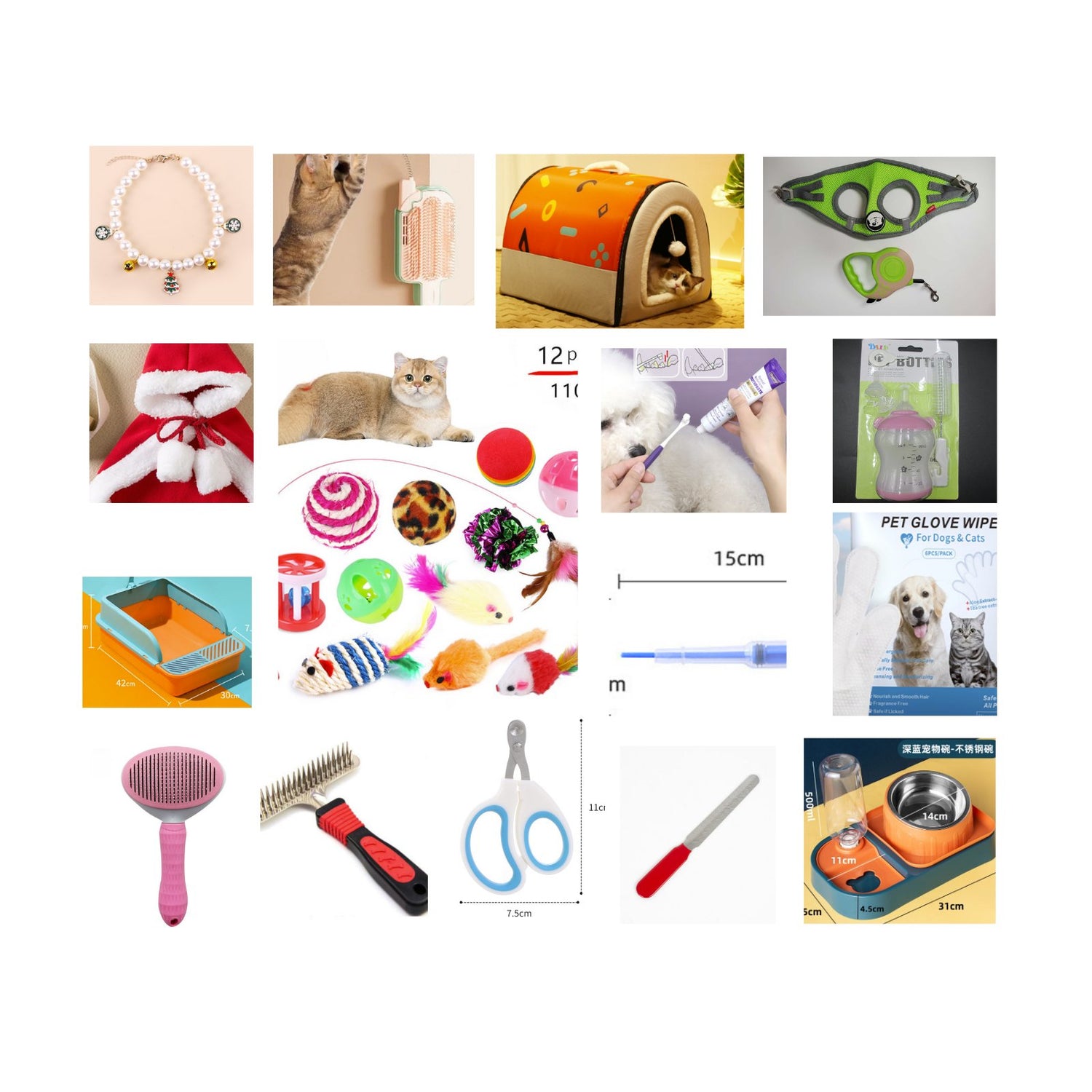Bringing home a new cat is an exciting and rewarding experience, but it also comes with responsibilities. To ensure a smooth transition for both you and your new furry friend, it's crucial to be well-prepared. This new cat owner checklist covers all the essentials you'll need to create a comfortable and loving home for your feline companion.
Preparation Before Bringing Home a New Cat
Before your new cat sets foot in your home, there are a few things you should prepare to make the transition as smooth as possible.
Create a Safe Space: Set up a quiet, cozy area where your new cat can retreat when feeling overwhelmed. This could be a spare bedroom, a bathroom, or even a large closet. Ensure this space includes essentials like food, water, and a litter box. A comfortable hiding spot, like a covered bed or a cardboard box, can also help them feel secure.
Cat-Proof Your Home: Cats are naturally curious and love to explore. Ensure your home is safe by securing loose wires, removing toxic plants, and keeping small objects out of reach. Block off any nooks and crannies where a cat could get stuck. Consider using baby gates to create cat-safe zones, especially if you have other pets or small children.
Plan the Introduction: If you have kids, babies, or other animals, planning the introduction carefully is crucial. Gradual introductions can help minimize stress and potential conflicts. Start by allowing your new cat to explore their safe space alone. Gradually introduce them to other family members and pets under supervision. Positive reinforcement and patience are key to creating a harmonious environment.
Schedule a Vet Visit: Arrange a vet appointment within the first week of bringing your new cat home. This initial visit is crucial for a health check-up, vaccinations, and discussing any concerns or questions you may have about your new pet's well-being.
Essential Supplies for Your New Cat
To ensure your new cat feels comfortable and at home, gather these essential supplies:
Food and Water Bowls: Invest in sturdy, non-tip bowls for food and water. Stainless steel or ceramic bowls are ideal as they are easy to clean and don’t harbor bacteria.
High-Quality Cat Food: Choose a well-balanced cat food that meets your cat's nutritional needs. Consult your vet for recommendations based on your cat’s age, weight, and health. Wet food can be a good addition to keep your cat hydrated, especially if they are prone to urinary issues.
Litter Box and Litter: A litter box is a must for any cat owner. Experts recommend having two litter boxes for one cat to avoid problems with cats not using the litter box. The Litter Genie Easy Roll pail is an excellent addition to your litter setup. It makes disposing of your cat’s litter quick and hassle-free, helping to keep your home smelling fresh. Check out this article for a comprehensive review of the Litter Genie Easy Roll.
Cat Carrier: A sturdy cat carrier is essential for trips to the vet and other outings. Choose one that is well-ventilated and comfortable for your cat. Look for carriers with easy access points to make loading and unloading less stressful.
Bedding and Blankets: Provide your cat with a cozy bed and soft blankets. Cats love to snuggle up in warm, soft places. Consider placing beds in multiple locations around your home to give your cat plenty of options.
Toys and Scratching Posts: Toys and scratching posts are crucial for keeping your cat entertained and preventing them from scratching your furniture. Interactive toys, like feather wands and laser pointers, can help keep your cat engaged and active. Scratching posts should be sturdy and tall enough for your cat to stretch fully.
Grooming Supplies: Brushes, nail clippers, and cat-safe shampoo are essential for keeping your cat clean and well-groomed. Regular grooming sessions can help reduce shedding and prevent matting, especially for long-haired cats.
Identification and Microchipping: Ensure your cat has a collar with an ID tag. Microchipping your cat is also a good idea in case they get lost. Keep your contact information up to date in the microchip registry.
Bringing Home Your New Cat
The day has finally arrived to bring your new cat home. Here are some tips to make the transition smooth:
The Car Ride Home: Place your cat in a carrier to ensure their safety during the car ride. Speak to them in a calm, soothing voice to help ease their anxiety. Avoid loud music or sudden movements that could startle them.
Introducing Them to Their Safe Space: Once home, take your cat to their designated safe space. Let them explore this area before gradually introducing them to the rest of the house. Allow your cat to acclimate to their new surroundings at their own pace. Some cats may hide for a few days before feeling comfortable enough to explore.
Settling In: The First Few Weeks
The first few weeks are crucial for building a strong bond with your new cat.
Establish a Routine: Cats thrive on routine. Set regular times for feeding, play, and grooming to help your cat feel secure. Consistency will help them adjust more quickly to their new environment.
Gradual Introduction to Other Pets: If you have other pets, introduce them to your new cat gradually. Allow them to sniff each other under the door and use baby gates for initial meetings. Keep interactions short and positive, gradually increasing the time they spend together.
Monitor Their Health: Keep an eye on your cat’s health during the first few weeks. Schedule a vet visit for a wellness check and vaccinations. Watch for signs of stress or illness, such as changes in appetite, grooming habits, or litter box usage.
Essential Training and Socialization
Training and socializing your new cat is essential for their well-being.
Litter Training: Most cats are naturally inclined to use a litter box. Show your cat where the litter box is located and keep it clean. Using a high-quality litter and a reliable disposal system like the Litter Genie Easy Roll can make litter training easier and more pleasant for both you and your cat.
Scratching Training: Encourage your cat to use a scratching post by placing it in a prominent location and using catnip to attract them. Provide multiple scratching options, such as vertical posts and horizontal scratchers, to see what your cat prefers.
Socialization: Spend time playing and bonding with your cat. Use toys and treats to encourage positive interactions. Gentle handling and regular play sessions can help build trust and reduce anxiety.
Health and Wellness
Maintaining your cat’s health is vital.
Regular Vet Visits: Schedule regular vet check-ups to monitor your cat’s health and keep vaccinations up to date. Regular visits can help catch potential health issues early.
Diet and Nutrition: Provide a balanced diet tailored to your cat’s needs. Avoid giving them human food and consult your vet if you have any concerns. Fresh water should always be available and consider using a pet fountain to encourage drinking.
Exercise and Mental Stimulation: Ensure your cat gets plenty of exercise and mental stimulation through play and interaction. This helps prevent obesity and behavioral issues. Interactive toys, puzzle feeders, and regular playtime can keep your cat active and engaged.
Grooming: Regular grooming keeps your cat’s coat healthy and reduces shedding. Brushing your cat also provides an opportunity to check for any skin issues or parasites. Pay attention to your cat's teeth and ears and consult your vet for advice on dental care.
Creating a Happy Home
Creating a happy home for your cat involves more than just providing the basics.
Interactive Toys: Invest in interactive toys like feather wands and laser pointers to keep your cat engaged. Rotate toys regularly to keep your cat interested.
Window Perches: Cats love to watch the world go by. Set up a window perch where your cat can enjoy the view. This can provide hours of entertainment and mental stimulation.
Cat Trees and Climbing Furniture: Cat trees and climbing furniture provide exercise and entertainment. They also give your cat a place to retreat and feel safe. Place them near windows or in rooms where your cat spends a lot of time.
Quality Time: Spend quality time with your cat every day. This strengthens your bond and makes them feel loved and secure. Simple activities like petting, playing, and talking to your cat can make a big difference.
By following this new cat owner checklist and ensuring you have all the essentials, you’ll be well-prepared to provide a happy, healthy home for your new feline friend. Remember, patience and love are key to helping your cat adjust and thrive in their new environment


